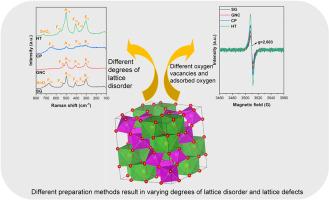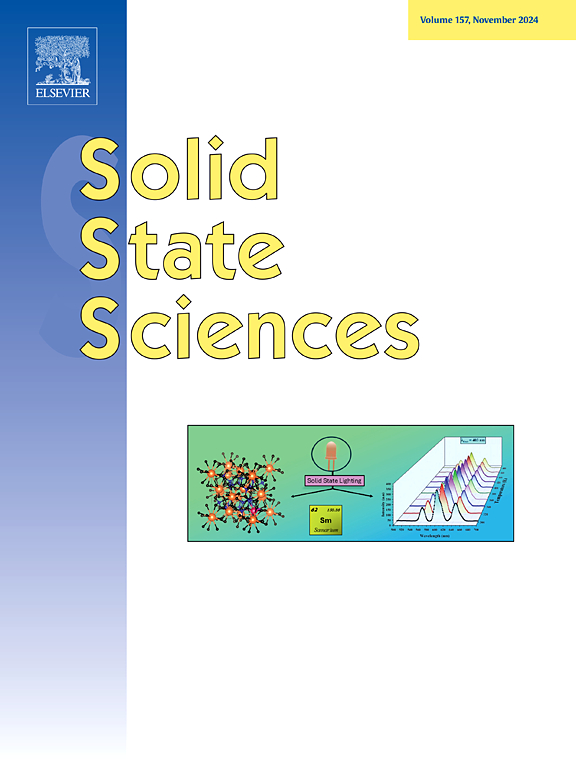不同晶格无序度和氧空位含量的 Nd2Sn2O7 烧绿宝石的合成
IF 3.4
3区 化学
Q2 CHEMISTRY, INORGANIC & NUCLEAR
引用次数: 0
摘要
本研究通过溶胶-凝胶(SG)技术、硝酸甘油燃烧(GNC)、共沉淀(CP)和水热法(HT)等简单方法制备了一系列具有不同晶格无序度和氧空位含量的 Nd2Sn2O7 热长石。事实证明,拉曼光谱在确定热绿石型复合氧化物的晶格无序度和晶格缺陷方面最为有效,其次是 XRD,而傅立叶红外光谱则是灵敏度最低的技术。对于纯相 Nd2Sn2O7,氧空位和吸附氧的含量遵循 CP > GNC > SG 的序列,这与晶格无序度十分吻合。这是因为 Nd2Sn2O7 烧绿石的晶格无序度越高,Sn-O 键就越弱,更容易断裂并形成氧空位。虽然 HT 样品的无序度最低,但它与表面残留的 SnO2 的协同效应有利于进一步富集氧空位。本文章由计算机程序翻译,如有差异,请以英文原文为准。

Synthesis of Nd2Sn2O7 pyrochlore with different lattice disorder degrees and oxygen vacancy contents
In this study, a series of Nd2Sn2O7 pyrochlores with different lattice disorder degrees and oxygen vacancy contents were prepared via simple methods, including the sol–gel (SG) technique, glycine–nitrate combustion (GNC), coprecipitation (CP), and the hydrothermal (HT) method. Raman spectroscopy proved the most effective in identifying the lattice disorder degree and lattice defects of the pyrochlore-type composite oxides, followed by XRD, with FTIR spectroscopy as the least sensitive technique. For pure phase Nd2Sn2O7, the content of oxygen vacancies and adsorbed oxygen species follow the sequence CP > GNC > SG, which is well consistent with the lattice disorder degrees. This is because that the higher the lattice disorder of Nd2Sn2O7 pyrochlore, the weaker the Sn-O bond, making it easier to break and form oxygen vacancies. Although the HT sample exhibits the lowest disorder degree, its synergistic effect with residual SnO2 on the surface is beneficial for further enriching oxygen vacancies.
求助全文
通过发布文献求助,成功后即可免费获取论文全文。
去求助
来源期刊

Solid State Sciences
化学-无机化学与核化学
CiteScore
6.60
自引率
2.90%
发文量
214
审稿时长
27 days
期刊介绍:
Solid State Sciences is the journal for researchers from the broad solid state chemistry and physics community. It publishes key articles on all aspects of solid state synthesis, structure-property relationships, theory and functionalities, in relation with experiments.
Key topics for stand-alone papers and special issues:
-Novel ways of synthesis, inorganic functional materials, including porous and glassy materials, hybrid organic-inorganic compounds and nanomaterials
-Physical properties, emphasizing but not limited to the electrical, magnetical and optical features
-Materials related to information technology and energy and environmental sciences.
The journal publishes feature articles from experts in the field upon invitation.
Solid State Sciences - your gateway to energy-related materials.
 求助内容:
求助内容: 应助结果提醒方式:
应助结果提醒方式:


